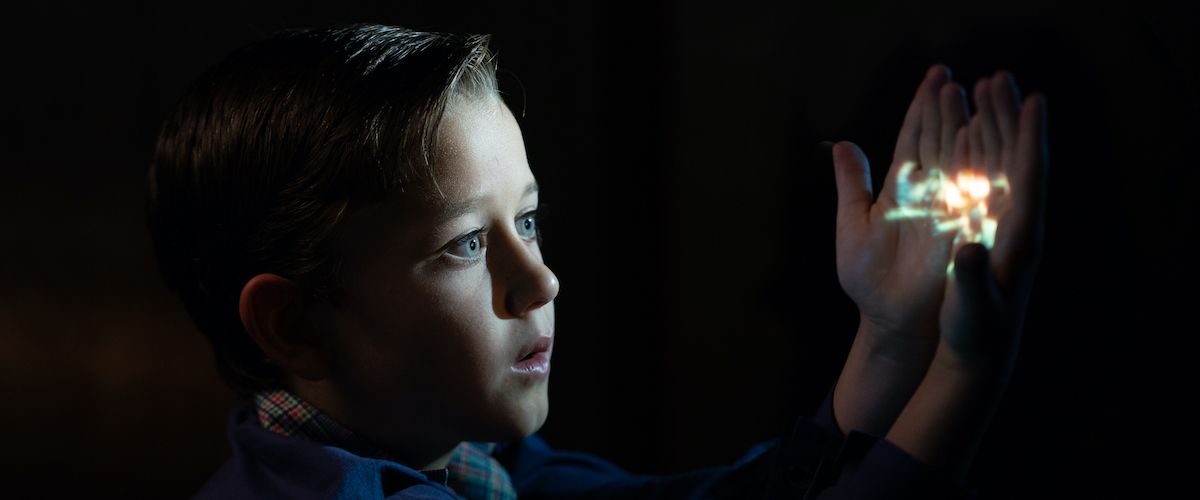By Jonah Naplan
November 26, 2022

CRITIC'S PICK
The Fabelmans
Review: Steven Spielberg's self-reflection picture is multi-faceted, emotional, and beautiful.

By Jonah Naplan
November 26, 2022

Steven Spielberg’s newest film, “The Fabelmans,” is everything that I love about movies. And, ironically, it’s a movie about the love of movies. Steven Spielberg claims that “The Fabelmans” is based on his real childhood and life growing up in New Jersey, Arizona, and California, where he found his love for movies at a young age, and quickly realized that he wanted to make his own. Young Spielberg has been replaced here by an eager Sammy Fabelman (Gabriel LaBelle as a teenager and Mateo Zoryon Francis-DeFord as a youngster) who finds himself in a conundrum, as he must decide what’s most important to him.
The Fabelmans are a middle-class Jewish family living in the middle of the 20th century. Burt Fabelman (Paul Dano) is the patriarch, a hard-working engineer who sees a bright future for him and his colleague/best friend, Benny Loewy (Seth Rogen). Mr. Fabelman is married to Mitzi Fabelman (Michelle Williams with a surprising resemblance to Spielberg’s actual mother), who retired from being a concert pianist and now works as a piano teacher and housewife. The film opens in New Jersey in 1952, when the two aforementioned take eight-year-old Sammy Fabelman to his first big-screen experience at a screening of “The Greatest Show on Earth.” Young Sammy is haunted by a shot of a moving train crashing into a car sitting in the middle of a railroad track, but attempts to make these sequences less scary after he asks for a train set for Hanukkah and recreates the train crash over and over again. Then Mitzi suggests that he record the train crash one last time, so he can still watch it as many times as he pleases, but without risk of breaking the locomotive. Then Sammy begins to film everything. And with a smart transition that jumps from him leading his dad’s car into the driveway of their new Arizona home, to him directing his friends in the Sonoran desert, we learn he’s actually pretty good at it too. But with the Fabelman family falling apart, Sammy is told he must quickly decide if his passion or his family is more important.
The performances in “The Fabelmans” are stellar, particularly Oscar-worthy runs from Dano and Williams. Their dynamic as parents feels grounded and real in every scene, especially as their relationship begins to get tested, most noticeably when the family embarks on a camping trip, whereas through Sammy’s camera footage, we see Mitzi clearly flirting with Benny, who has basically become a part of the Fabelman family. The issue is that Burt is a high-achieving scientist who can be a bit boring, but he still worships Mitzi, who feels like a nobody when compared to her husband. And quite frankly, Burt is always loving and loyal to his family, but he isn’t the most interesting person to listen to. That’s where Benny finds his strength. He’s funny, he’s charismatic, and he’s interesting to be around. Notice the first scene of the Fabelmans’ camping trip, when Burt tries to teach his daughters about how to build a fire, whilst Benny has pulled back a strong branch with Mitzi attached, swinging her back and forth. Benny is the fun husband Mitzi wishes she had.
In two powerful scenes, Sammy reviews the footage from the camping trip—while trying to make a video collage, in an effort to cheer Mitzi up after her own mother dies—and finds these hidden things in the background. And in a later scene, he sits on his bed, as his mother watches edited footage of these clips of her and Benny in Sammy’s closet. The way these two scenes are portrayed is brilliant. The way small moments in “The Fabelmans” enact huge emotions can only be courtesy of a director who has been in the business long enough to know each and every person in any given audience.
There are any number of highly resonant sequences inside of “The Fabelmans,” but they only work because of how realistic and grounded the characters always seem. Sammy Fabelman is a protagonist who’s endearing to watch, especially as his movies improve, and become better and more visually impressive each time. He films one World War II movie with his pack of Eagle Scouts and wins a photography badge for his work. Part of the novelty while watching “The Fabelmans” is seeing how much Sammy grows in his work, and observing how things all around him inspire his films. Notice how he gets the idea to poke holes in his film in place of gun shots after Mitzi’s high heel pokes a hole in her sheet music. Sammy picks up the paper, mystified.
In one scene, Sammy’s great uncle Boris (Judd Hirsch) comes to stay, and gives him a monologue about what Sammy must do now that he’s committed himself to his art. Boris was a circus performer, and makes a comparison to sticking his head in a lion’s mouth. That’s not the art. The art is reckoning how to remove your head without getting killed. It ties back to the very movie that made Sammy Fabelman want to make movies in the first place. Another inspiration is “The Man Who Shot Liberty Valance,” and in a later scene, Sammy meets John Ford (an expertly cast David Lynch), the director of that film.
Spielberg’s footprint is stamped all over “The Fabelmans,” but not just because it’s his life story. There are homages to his most famous works, and it sometimes feels as if he’s winking at the camera. It’s not always supposed to be played with a straight face. The last shot of the film, in fact, is a gimmick, that’s almost contrary to the concreteness of the last two and a half hours that we just watched. It’s the simple truth of the matter that always makes “The Fabelmans” feel especially close to home. It’s not a blockbuster, or even a big, showy musical, like Spielberg’s last, “West Side Story.”
The auteur, who also happens to be my favorite director of all time, crafts a narrative that feels more human than any other movie I’ve seen this year. Although, there’s really nothing all that remarkable about the Fabelmans. Sure, they may be the only Jews within several miles of their home in California, but other than that, they’re your average suburban family living with struggles that may be extreme, but any family can relate to them too. In any inferior director’s hands, “The Fabelmans” would have most likely failed as a movie. But Spielberg paints these fairly ordinary people in such a light that they become anything but that. Most of the best Spielberg movies—”Close Encounters of the Third Kind,” “Indiana Jones and the Temple of Doom,” “Minority Report,” “E.T. The Extra-Terrestrial,” “Catch Me If You Can,” etc—all deal with concepts that are fantastical, or unlikely narratives. But Spielberg is equally as good at telling stories that deal with real themes such as grief, passion, responsibility, family, and love as he is at shooting Indiana Jones on the run from bandits.
What “The Fabelmans” wants to tell us is that there really is no right or wrong way to express your feelings about your passion. And even when tragedy strikes in your family, you’re not in the wrong to still care about what you love doing. Sammy Fabelman learns this the hard way as he progresses through the ups and downs of his childhood, but his experiences always make the viewer empathize with his character. “The Fabelmans” is a movie with tons of pathos crammed into it, but all of it feels earned, and never drags itself into a sappy Oscar-bait movie that relies on the audience’s perception to be effective. Leaving the theater, I couldn’t help but think about the last time a movie captivated me this much. I have still not come up with my answer.
Now playing in theaters.
"The Fabelmans" is rated PG-13 for some strong language, thematic elements, brief violence and drug use. It's 151 minutes.
JONAHtheCRITIC.com